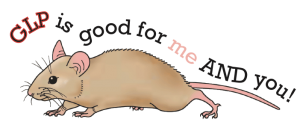This piece was written after attending an iJOBS workshop entitled: An Introduction to Good Laboratory Practices presented by Melissa Elliott from Envigo on May 8th, 2017 in Piscataway, NJ. Good laboratory practices (GLPs) are a series of regulations which standardize the quality of research used in clinical trials, or food development. Before human consumption, or treatment, there are several stages of research: exploratory, preclinical development, clinical trial, and manufacturing. The latter three stages are all federally regulated. From an academic viewpoint, it seems like an industry built on bureaucracy, not relevant to anything I deal with on a daily basis. Yet, Melissa Elliott, head of Quality Assurance at Envigo , made it clear during her recent iJOBS workshop that the downstream consequences of GLPs, like patient safety, are dire and that GLP comes down to ethics. We were first shown one part of a British docu-series that detailed the horrors of Industrial Bio-Test (IBT) and the lack of GLPs. I won’t go too much into the scandal, as I would hate to deprive you of salacious internet searching, however, this video highlighted the necessity of laboratory regulation. It is a story we see time and time again: a scientist turns out to be human (to err is human…) —> the public loses trust (…to forgive, divine!) in an entire industry. And, findings that have been tested and proven through more than one method are questioned; in short, both sides suffer. This story is an exaggeration on both ends. The kind of malfeasance that occurred at IBT was not an error, but rather intentional deception. As one of the top contract research organizations (CROs), IBT was responsible for over one third of all products that came to market (Think: Roundup and aspartame.). CROs are a growing industry, and if you work at a lab, you will likely do business with at least one of these in your career. In fact, you may have already if you order animals for experiments. Jackson Laboratories and Charles River are examples of CROs that provide rodents, both standard and transgenic strains, to many labs here at Rutgers. Envigo is another CRO to which many labs outsource pharmaceutical testing. The workshop revealed that we as academics could be implementing GLPs upstream of any market-based product. Sometimes bad science is intentional and sometimes it is just an error. Yet, if following GLPs, we can at least avoid the need for situations that require the public’s forgiveness. Here are some of the highlights of the GLP workshop:
- Keep your data! Most federal regulatory agencies require that data be kept at least 5 years after study completion. However, CROs like Envigo sometimes keep theirs indefinitely in an archive.
- Speaking of data…raw is always better. But, make sure someone in the next decade will be able to read it. Scratched CDs and bent floppy disks are the stuff of nightmares.
- Verify the integrity of your controls. If you are testing a drug, how sure are you that your control mouse wasn’t given a substance that your test mouse was? If it’s, “Because I remember!”, it’s not good enough.
- Environmental conditions matter. A fire in an unconnected department will be noted in study notes. Humidity and temperature can lead to unwanted outliers.
- Homogeneity of samples. Is that drug you are feeding your animal *actually* mixed into every bite he is taking?
- Identification, Concentration, Expiration Date, and Storage Conditions. A great acronym for your reagent reporting! (Add Batch #)
- Healthy and happy animals lead to clean results. Period.
 As a basic scientist, it may be difficult to wrap your head around things like federal regulations that seem to have no impact on your exploratory research. However, one of the quotes from Ms. Elliott that I think hits home, “the data should speak for itself”. Something as simple as keeping a detailed lab notebook can ensure that your lab’s research and findings will outlive you. In academia, this is a choice (for now), but at CROs it is a mandate. The good news is that good science looks good wherever you go. Though you may not know where that next place will be, proper training will follow you just as much as sloppy technique, and will certainly take you further. While this workshop gave us a coveted look at how a CRO does quality assurance, the skills it taught us are translatable to all aspects of a scientific career.
As a basic scientist, it may be difficult to wrap your head around things like federal regulations that seem to have no impact on your exploratory research. However, one of the quotes from Ms. Elliott that I think hits home, “the data should speak for itself”. Something as simple as keeping a detailed lab notebook can ensure that your lab’s research and findings will outlive you. In academia, this is a choice (for now), but at CROs it is a mandate. The good news is that good science looks good wherever you go. Though you may not know where that next place will be, proper training will follow you just as much as sloppy technique, and will certainly take you further. While this workshop gave us a coveted look at how a CRO does quality assurance, the skills it taught us are translatable to all aspects of a scientific career.